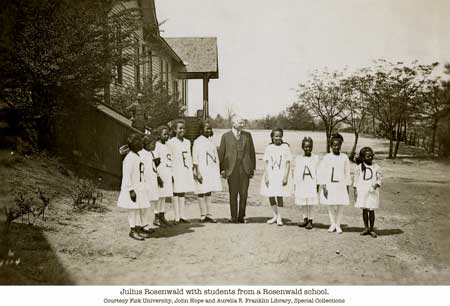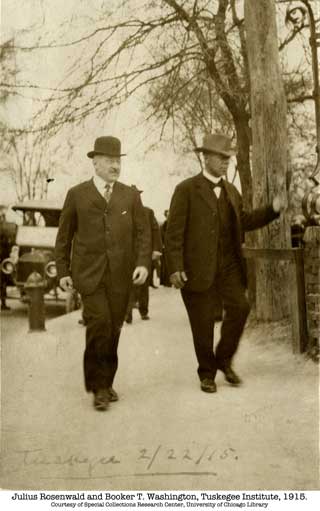Film (2015)
Directed by Aviva Kempner

Photo: Courtesy Fisk University
John Hope and Aurelia M. Franklin Library, Special Collections
This competent and insightful documentary about a great Jewish-American businessman and philanthropist provides what is likely to be a pair of revelations – that the empire he built was none other than Sears Roebuck, and that he was a major, and path breaking, donor to the cause of educating young African-Americans.
Julius Rosenwald (1862- 1932) was the son of Samuel, an immigrant who came to this country in the mid-nineteenth century, earning his keep, at first, as a door to door peddler in the South and then in his wife’s family business in Springfield, Ill., the home of Abraham Lincoln. Lincoln, in fact, had been a client of that business, the Hammerslough Brothers Store, which also did a lot of business selling Civil War uniforms. Julius grew up in a house right across the street from what had been Lincoln’s residence.
At sixteen, Julius’ parents sent him to New York to apprentice in the family’s main store, and somewhat later Julius got the bug to open a haberdashery business on his own, and moved to Chicago to avoid conflict with the Hammerslough Brothers in New York. Later on, through a connection via his brother-in-law, Rosenwald embarked on a partnership with Richard Sears of Sears and Roebuck after Sears called Rosenwald in a panic to get an order of 1,000 suits filled. Sears, apparently a genius marketer and a poor manager, was able to sell almost anything to anyone through his charming and engaging catalog, but was not so great at making the whole operation work efficiently. At the time, Roebuck wanted out, and Rosenwald, joining with Sears, bought him out.
Seeing the Sears Roebuck catalog as a peddler in every mailbox, Rosenwald, an efficiency expert, built an empire, eventually becoming the sole head of the operation when Richard Sears resigned in 1908. An early friend of Marcus Goldman (of the financial firm of Goldman-Sachs) from the New York days, Rosenwald approached him for a loan and Goldman suggested taking the company public. Rosenwald did so, making Sears Roebuck one of the very first IPOs and, in the process, making Rosenwald immensely wealthy. Early on, Rosenwald had specified a guideline to himself regarding money: of the $15,000 he hoped to earn annually, he planned to save $5000, to spend $5000 and to give away $5000. Now, with much more to his name, Rosenwald adhered much to the same principles and became a major philanthropist.

At Tuskegee Institute, 1915
Photo: Courtesy of Special Collections Research Center
University of Chicago Library
Rosenwald had been deeply inspired, in religious and social dimensions, by Rabbi Emile Hirsch who was on the board of most of the major progressive organizations in Chicago and who introduced Rosenwald to a philosophy of charitable giving. At the same time, Rosenwald was moved deeply by two books given to him by Paul Sachs of Goldman-Sachs: “Up From Slavery,” Booker T. Washington’s autobiography, and “An American Citizen,” a biography of William Henry Baldwin, Jr., a white railroad businessman-philanthropist who became interested and significantly involved in the
plight of African-Americans.
Certainly aware of and sensitive to the trials of Jews in Russia at the time, Rosenwald noted the parallel issue closer to home (in paraphrase) that “we look down on Russians for the way they treat the Jews, but we do the same here with African-Americans.” As a result, Rosenwald visited, and got intimately involved, with the operations of Booker T. Washington’s Tuskegee Institute and embarked significantly on the building of what became over 5000 small schools particularly targeted to the education of African-American children who, in the early part of the twentieth century, would not have had opportunities of the kind otherwise.
It’s an amazing story and one that director Aviva Kempner conveys through a deft interleaving of an historic account of Rosenwald’s business and philanthropic career and interviews with African- American luminaries like John Lewis, Julian Bond, Rita Dove, Gordon Parks and Maya Angelou, among numerous others. All express profound appreciation for Rosenwald’s singular role in providing support for African-Americans at a crucial time. Dove identifies the Rosenwald Fund as the “single most important funding agency for African-Americans.”
Rosenwald’s other philanthropic efforts in support of African-Americans included, among many others, funding a portion of the cost of twentyseven YMCAs across the country. (Apparently President William Howard Taft personally solicited Rosenwald for a donation to help build the Washington D.C. branch, and Booker T. Washington published a piece entitled “A Remarkable Triple Alliance: How A Jew is Helping the Negro Through the YMCA”.)
Both inspiring and well researched, “Rosenwald” tells a moving story adroitly, offering a significant and reassuring sense of the profound effects this thoughtfully motivated Jewish philanthropist had on the lives of many African-Americans.
– Originally published as ‘Rosenwald’: the unexpected story of a Jewish philanthropist by Charles Munitz (aka BADMan) in the September 4, 2015 edition of The Jewish Advocate
Leave a Reply